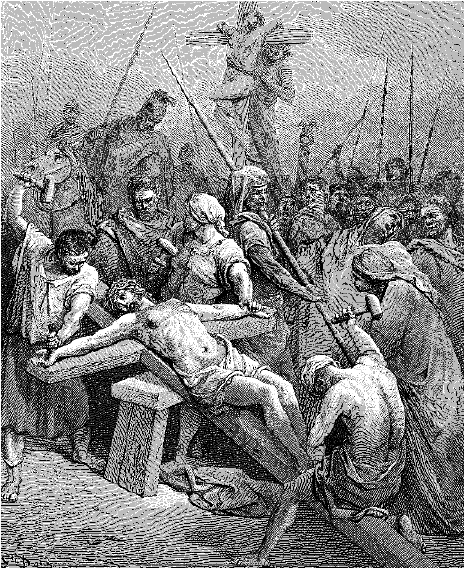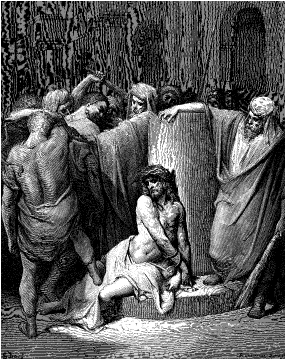Lost Christianities
The Battles for Scriptures and
The Faiths We Never Knew
Bart D. Ehrman
(Oxford)
The Battles for Scriptures and
The Faiths We Never Knew
Bart D. Ehrman
(Oxford)

Just when you thought it was safe to take the wafer (or be washed in the blood of the lamb) along comes Bart Ehrman to examine, in detail, the first two or three centuries of Christianity and reveal that:
- There are twenty-seven books in the New Testament; but it is just happenstance, not divine intervention, that brought about the inclusion of the Books of Matthew, Mark, and John ... and not the Books of Thomas, Mary, Philip, and the "Secret Mark."
- Early Christians --- the ones that didn't win the haggles with the likes of Tertullian, Justin, Irenaeus, and Hyppolytus --- conceived of two, three, seven, and, in one case, 365 gods.
- "Apostolic succession," part of the canon of the Mother Church, was not conceived of by Jesus but invented at the end of the first century AD by Clement, an early bishop of Rome.
- Martyrdom, so dear to the hearts of modern Christians, did not come into fashion with Jesus, but with someone named Polycarp, in 110 AD, as reported by Ignatius.
- Soon after Polycarp, martyrology was reconfirmed by Tertullian, who wrote "the leg does not feel the chain when the mind is in the heavens."
- The very fact that Jesus was Jewish was not acknowledged by most Christians until well into the 19th Century.
- Gnostics, so reviled by early Christians, believed that there was a cruel (or demented, or savage) god that placed man on earth, causing our "cosmic catastrophe;" they emphasized that Christ had come to show how we could use faith and knowledge to escape from this madhouse.
- The Old Testament was included in what we have come to know as the Bible because in Rome of AD 100 - 200 --- among all the competing Christianities --- one's faith had to show roots in antiquity. By marrying the Hebrew Bible with Matthew, Mark, Luke et al, the early "proto-orthodox" bishops and writers were able to make their Christianity more acceptable than all others.
- In early Christianity there were writings known as the "Secret Gospel." Jesus had raised one young man from the dead, and, according to the text, he "looked at him intently and loved him and ... he stayed with him that night, for Jesus was teaching him the mystery of the Kingdom of God." (One scholar, Morton Smith, offers the startling idea that this was a tale of passion in the modern, not ancient, sense of the word.)
- It was not until 367 AD that the New Testament was codified. One Athanasius, bishop of Alexandria, wrote "a letter to the churches throughout Egypt" dictating that only the twenty-seven books we now know should be included as Scripture, insisting "that the other 'heretical' books not be read."
§ § §

Lost Christianities is astonishing, hard to put down. Like the bishops that created the "proto-orthodox" reading of Christ's life and works, Ehrman is a master of dialectic reasoning. You and I have been persuaded all these years that "The Scripture" is just that, a divine message from on high. Ehrman presents us with the myriad facts of other Christianities, those that fought the good fight and lost out --- often through propaganda, subterfuge, and outright lies propagated by those who held the vast power of the church in the first two or three centuries.
Especially grievous for Christians might be the loss of spiritual bonding taken from early believers, a unity of "charismatic communities, directed by the Spirit of God, who gave each member a special gift ... to assist them to live and function together as a communal body, gifts of teaching, prophesying, giving, leading..." In the early days of the monolithic religion, one that came to brook no dissent, the community was destroyed, as were gospels that did not meet the agenda of the mainstream Christians: Magnus, Theudas, Valentinus, Phibionites, Simon Magus and Thomas.
Orthodoxy triumphed. Those who opposed the party line were denounced as "heretics;" those who looked around and saw a world awash with sickness, greed, jealousy, poverty and woe --- who saw humanity alone in a "cesspool of misery" --- found their characters assassinated for not buying into the strange concept of a divine who, it was written, made the world, and --- despite the obvious poverty, disease, injustice, rapine and pillage --- "it was good."
--- Lolita Lark